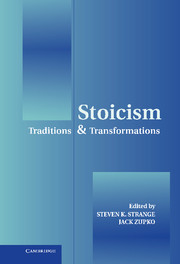Book contents
- Frontmatter
- Contents
- List of Contributors
- Acknowledgments
- List of Abbreviations
- Stoicism
- Introduction
- 1 The Socratic Imprint on Epictetus' Philosophy
- 2 The Stoics on the Voluntariness of the Passions
- 3 Stoicism in the Apostle Paul: A Philosophical Reading
- 4 Moral Judgment in Seneca
- 5 Stoic First Movements in Christianity
- 6 Where Were the Stoics in the Late Middle Ages?
- 7 Abelard's Stoicism and Its Consequences
- 8 Constancy and Coherence
- 9 On the Happy Life: Descartes vis-à-vis Seneca
- 10 Psychotherapy and Moral Perfection: Spinoza and the Stoics on the Prospect of Happiness
- 11 Duties of Justice, Duties of Material Aid: Cicero's Problematic Legacy
- 12 Stoic Emotion
- Works Cited
- Name Index
- Subject Index
4 - Moral Judgment in Seneca
Published online by Cambridge University Press: 11 July 2009
- Frontmatter
- Contents
- List of Contributors
- Acknowledgments
- List of Abbreviations
- Stoicism
- Introduction
- 1 The Socratic Imprint on Epictetus' Philosophy
- 2 The Stoics on the Voluntariness of the Passions
- 3 Stoicism in the Apostle Paul: A Philosophical Reading
- 4 Moral Judgment in Seneca
- 5 Stoic First Movements in Christianity
- 6 Where Were the Stoics in the Late Middle Ages?
- 7 Abelard's Stoicism and Its Consequences
- 8 Constancy and Coherence
- 9 On the Happy Life: Descartes vis-à-vis Seneca
- 10 Psychotherapy and Moral Perfection: Spinoza and the Stoics on the Prospect of Happiness
- 11 Duties of Justice, Duties of Material Aid: Cicero's Problematic Legacy
- 12 Stoic Emotion
- Works Cited
- Name Index
- Subject Index
Summary
We are all familiar with the notion of a moral judgment. In the vocabulary of ethical debate, this term is so common as to be a cliché. While we have different theories about how we make such judgments, it would seem distinctly odd to observe that “judgment” is a term transferred from another semantic domain and to attempt to sort out its meaning by scrutinizing its source or to impugn the clarity or usefulness of the term on the grounds that it began its conceptual career as a mere metaphor. Whatever origins the term may have had, they now seem irrelevant.
But is this really so? I want to argue that moral judgment has not always been taken as a bland general synonym for moral decisions and that it need not be; to see that, we can consider uses of the terminology of moral judgment in which the original semantic sphere for such language (the judicial sphere) is still relevant to understanding how it is used. One such use comes from the Stoic Seneca, and I argue that he did take the notion of moral judgment as a live metaphor, one that he used to develop his own distinctive Stoic views on moral thinking.
That the particular language we use in talking about moral decision and moral assessment should matter is not surprising. Even for us, this is not the only way to talk about such matters; we also invoke the notions of deduction, calculation, and analysis, for example.
- Type
- Chapter
- Information
- StoicismTraditions and Transformations, pp. 76 - 94Publisher: Cambridge University PressPrint publication year: 2004



